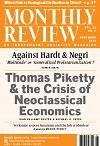Volume 66, Issue 06 (November)

On September 20, 2014, while corporate and government officials arrived in New York City for the UN Climate Summit, organizers and activists from around the world participated in a peoples’ summit called the NYC Climate Convergence (organized by the Global Climate Convergence and System Change Not Climate Change). The NYC Climate Convergence featured as the lead keynote speaker Naomi Klein, who presented the analysis of her new book, This Changes Everything: Capitalism vs. the Climate (Simon and Schuster, 2014). Her concluding chapter, significantly, is entitled “Leap Years: Just Enough Time for the Impossible.” Monthly Review readers will be interested that Klein observes in her book: “Karl Marx… recognized capitalism’s ‘irreparable rift’ with the ‘natural laws of life itself’”. Later she refers to “global capitalism’s voracious metabolism”. | more…
Not since the Great Depression of the 1930s has it been so apparent that the core capitalist economies are experiencing secular stagnation, characterized by slow growth, rising unemployment and underemployment, and idle productive capacity. Consequently, mainstream economics is finally beginning to recognize the economic stagnation tendency that has long been a focus in these pages, although it has yet to develop a coherent analysis of the phenomenon. Accompanying the long-term decline in the growth trend has been an extraordinary increase in economic inequality, which one of us labeled “The Great Inequality,” and which has recently been dramatized by the publication of French economist Thomas Piketty’s Capital in the Twenty-First Century. Taken together, these two realities of deepening stagnation and growing inequality have created a severe crisis for orthodox (or neoclassical) economics. | more…
Multitude or Generalized Proletarianization?
The term multitude was first used in Europe, it seems, by the Dutch philosopher Spinoza, to whom Michael Hardt and Antonio Negri explicitly refer. It then designated the “common people” who were a majority in the cities of the Ancien Régime and deprived of participation in political power (reserved for the monarch and the aristocracy), economic power (reserved for property owners of feudal ancestry or for the nascent financial bourgeoisie, both urban and rural—including the rich peasants), and social power (reserved for the Church and its clerics). The status of the common people varied. In the city, they were artisans, small merchants, pieceworkers, paupers, and beggars; in the country, they were landless. The common people in the cities were restless and frequently exploded into violent insurrections. They were often mobilized by others—particularly the nascent bourgeoisie, the active component of the Third Estate in France—in their conflicts with the aristocracy. | more…
The Role of Ecological Marxism and Constructive Postmodernism—Beyond the Predicament of Legislation
China is facing many serious environmental issues, including pollution in the air, groundwater, and soil. These problems have increased since China surpassed Japan as the world’s second-largest economy—and in spite of the Chinese government’s 2007 proposal to build an “ecological civilization,” and writing “ecological civilization” into the Chinese Communist Party’s (CCP) constitution in 2012. Take air pollution as an example; not long ago, cities such as Beijing, Tianjin, and Shanghai witnessed record-breaking smog. Concentrations of fine particulate matter (PM 2.5) reached more than forty times recommended safety levels. In China, up to half a million die each year because of air pollution, according to Chen Zhu, the former health minister of China.… What caused these serious environmental problems? A prevailing explanation is that China “lacks the rule of law”—especially environmental law.… Besides the legal issue, there are three factors responsible for China’s severe ecological crisis: (1) seriously underestimating the power of interest groups and the harmful consequence of capital; (2) the worship of growth or development; (3) an anthropocentric worldview. | more…
Marge Piercy is the author of eighteen poetry books, most recently The Hunger Moon: New & Selected Poems, 1980–2010 (Knopf, 2011). Her most recent novel is Sex Wars (Harper Perennial, 2005) and she has just published her first collection of short stories, The Cost of Lunch, Etc. (PM Press, 2014). | more…
